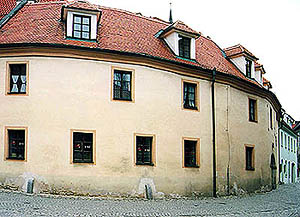Kájovská No. 55
Description of the Building:
A wide complex of corner buildings between the square, Kájovská
street, and Na louži. The main building has smooth street frontage
which ends with two Gothic gables. The main facade is smooth and
separated with many windows of various kinds. The interior on the
groundfloor is accessible through the portal with a pointed arch.
It follows with the hall which has a flat wooden joist ceiling.
Quite significant is a fragment of a Renaissance painting
representing a horse, situated in the hall. The hall narrows to a
vaulted passage with a Gothic wagon-vault and the passage vents to
the central yard of irregular rectangle shape. The groundfloor has
a two-part disposition. The peripheral masonry of the groundfloor
has a wooden log-cabin-type interspace. In the right part of the
house with a lowered groundfloor there is a space with a wooden
joist ceiling. The rooms in the first floor have mainly flat
ceilings with an exception of a chamber above the passage which has
wagon - vaults which repeats in mezzanine. In the yard on the left
is a one floor grange with a joist ceiling. The buildings were
built on the slope declining towards the Vltava
River.
Architectural and Historical Development:
This exceptionally significant building has Gothic origins from the
1st quarter of the 16th century. Among the Renaissance adaptions
are the facade decorated with sgraffito. In the Baroque period
separate wings and vaults were built. In 1867 an upper northern
floor was added, and the reconstruction was completed in 1989.
During the reconstruction the log-cabin structure was found in the
interior as were the wall paintings on the facade.
Significant Architectural Features:
Late Gothic portal with pointed arch. Fragment of Renaissance
painting representing a horse which was transfered to the hall
interior from the house Náměstí
No. 9 on the square.
 History of the House
Residents:
History of the House
Residents:
The first owner mentioned here was some Martin in 1424. Since 1510
Pavel Šnajdar, alias Paulšnajdar lived here. This name was
transfered to another house resident, a town councillor Kryštof
Kalšingar - Paulšnajdar, who married a widow of Pavel Šnajdar. In
1566, after his death, daughters Klára and Veruna sold the house to
doctor Tomáš Albín z
Helfenburka, a son of Rosenberg chancellor Václav Albín. In
1574 doctor Tomáš Albín became a bishop of Olomouc and he sold the
house to Lorenc Beneš. In 1590, after the death of Lorenc, the
house was bought by former Rosenberg officer Jiří Svérázký, who
sold it to Jiří Hrachovec in 1594. Since 1597 to 1608 Hrachovec
outlived two wives and then sold the house to a butcher Jiří
Dittrich. Other house owners were gradually Matyáš Prošek and
butcher Kryštof Pach. His widow Barbora sold the house to a hauler
Řehoř Trabalík, who according to a deed coming from 1654 brewed
beer here. After him a butcher Adam Schmidt moved to the house.
From 1727 a draper Vincenc Tukh lived here, later replaced with
bibliopeger Pavel Neuhauss. In 1739 - 1838 the house was occupied
with the Fridl family.
Present Use:
Hotel
Zlatý anděl (Golden angel)



